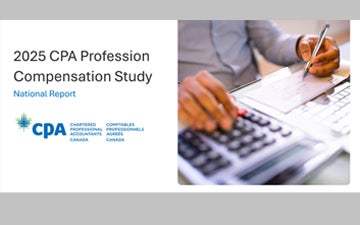CPA Canada survey says chartered professional accountants earning more than ever before

A deep dive into a CPA Canada national survey showing accounting profession provides long-term salary growth and compensation climbs with career experience
TORONTO, August 17, 2025 – CPAs are earning more than ever before and compensation is outpacing inflation, according to a national survey conducted by market research company Leger, for Chartered Professional Accountants of Canada. The 2025 CPA Compensation Study reports chartered professional accountants earned a national median compensation of $154,000 in 2024 — the highest since the study began in 2012 — for those with three years or more of experience in the profession.
Between 2022 and 2024, the survey suggests median compensation for CPAs rose by 7.7 per cent — exceeding Canada’s 6.4 per cent inflation rate over the same period — and a 47 per cent increase over 12 years, according to CPA Canada. The data was based on roughly 7,500 voluntary responses from CPAs regarding their 2024 compensation, of which less than five per cent resided abroad.
Many, many, many factors influence accounting salaries across Canada
There are more than 200,000 chartered professional accountants across Canada; compensation can vary widely based on location, employment sector and experience. Further, the compensation figures in the study are not necessarily “salaries,” as they include “non-base compensation,” such as bonuses (but not benefits).
While the public often thinks of “accountants” as working in accounting firms, the professional landscape of accounting is far more diverse. After establishing overall compensation figures, the CPA compensation survey distinguishes between “owners” and “non-owners” of businesses. An owner might include an accountant that owns his or her firm — as a principal, partner or sole practitioner — but non-owners make up most of the survey respondents.
Eleven per cent of all respondents were business owners, with 86% of these being owners of an accounting firm (sole and/or partner) and reporting a median compensation of $270K. Owners of other types of companies made up the remaining 14% and earned a median of $250K. Generally, the best salaries go to those who own their own companies, including partners.
Geography
CPAs pursuing the highest salaries in Canada might consider Alberta and its oil and gas industry. Median compensation is highest in Alberta ($169K) followed closely by Ontario — but Ontario is the place to be if you own your own business, especially as a sole practitioner. Eastern provinces report the lowest median compensation, with New Brunswick showing the lowest among those with at least 100 CPAs reporting ($128K).
When comparing salaries, accountants often discuss the cost of living (COL) where they work and reside. Toronto and Vancouver, for example, are “High COL” areas of Canada. Understandably, employers in large metropolitan areas also pay the best, with Vancouver, Calgary, Toronto, and Montréal all leading their respective provinces in compensation. Interestingly, public sector centres such as Ottawa, Edmonton, and Fredericton are lower in median compensation than business centres such as Toronto, Calgary, and Moncton respectively.
Sector
The oil and gas sector retained its top spot from 2023 with significant growth at $200K. Other top industries include real estate/building management ($180K), software ($178K), and financial services ($178K), with software showing significant growth.
At the other end of the spectrum is the public sector, where salaries across government, crown corporations, and government agencies were among the lowest. The sector remains attractive, however, due to public sector pension plans and relative job security (but rarely bonuses), especially in low COL regions.
Further information regarding employment sectors can be found in the regional reports. For example, in Ontario, only one per cent of respondents reported working in the oil and gas sector (likely in corporate offices). The highest salaries could be found in real estate/building management and the lowest in the public sector. Such data may belie the criticism of public sector employees receiving unduly high levels of compensation.
Experience
As one Reddit user posted, the survey “really shows how much [a]ccounting, and the CPA, is a long game approach to compensation.” The journey towards the chartered professional accountant designation includes a mandatory undergraduate degree and the graduate-level (post degree) CPA program, during which candidates work full-time and study part-time, that takes roughly two years to compete.
Those CPAs in the profession for less than three years reported a median salary of $92,000 and reached a median of $194,000 after 25 years in the profession. Just five per cent of survey respondents fell into the former category while 23% fell into the latter. According to CPA Canada, Statistics Canada data shows that median earnings for full-time Canadian workers reached $70,000 in 2024, “demonstrating the CPA designation’s strong earning power.”
Work From Home still a significant benefit for white-collar professionals
Many posters on social media generally agreed with the findings, such as “I always thought the compensation survey was a pretty good data set … in line with what I experienced in the market and way better than some of the guides out there that underestimates [compensation]” and “outputs are way more representative of actual compensation ranges than broad based compensation reports.”
One of the more intriguing aspects of the survey centres on work/life balance for non-owner CPAs.
Post-pandemic, many organizations allowed white-collar workers to continue remote work, as labour markets tightened and professionals preferred working from home. Indeed, the survey reports that 76% of CPAs participate in a work from home program, and eight per cent choose not to work remotely but could if they wanted.
The survey asserts that “work-from-home remained the most commonly used flexibility program but declined in both offering and usage, suggesting a shift to back-to-office,” but the decline in working from home was only three per cent. An Angus Reid survey recently reported that six out of 10 Canadian employees preferred to continue to work from home.
Several large Canadian employers (e.g., banks, governments) have recently told their employees that they must return to in-office work this fall. White collar workers are reporting that, after years of “hoteling,” open concept offices, and post-pandemic planning, office spaces are not equipped for an influx of workers.
It will be interesting to see how the push by Canadian companies — which suddenly have leverage due to economic fears driven by the United States — affects the work/life balance and compensation of chartered professional accountants.
Detailed reports for each province are available here.
Colin Ellis is a contributing editor to Canadian Accountant. Title image: CPA Canada's 2025 CPA Compensation Study.









(0) Comments